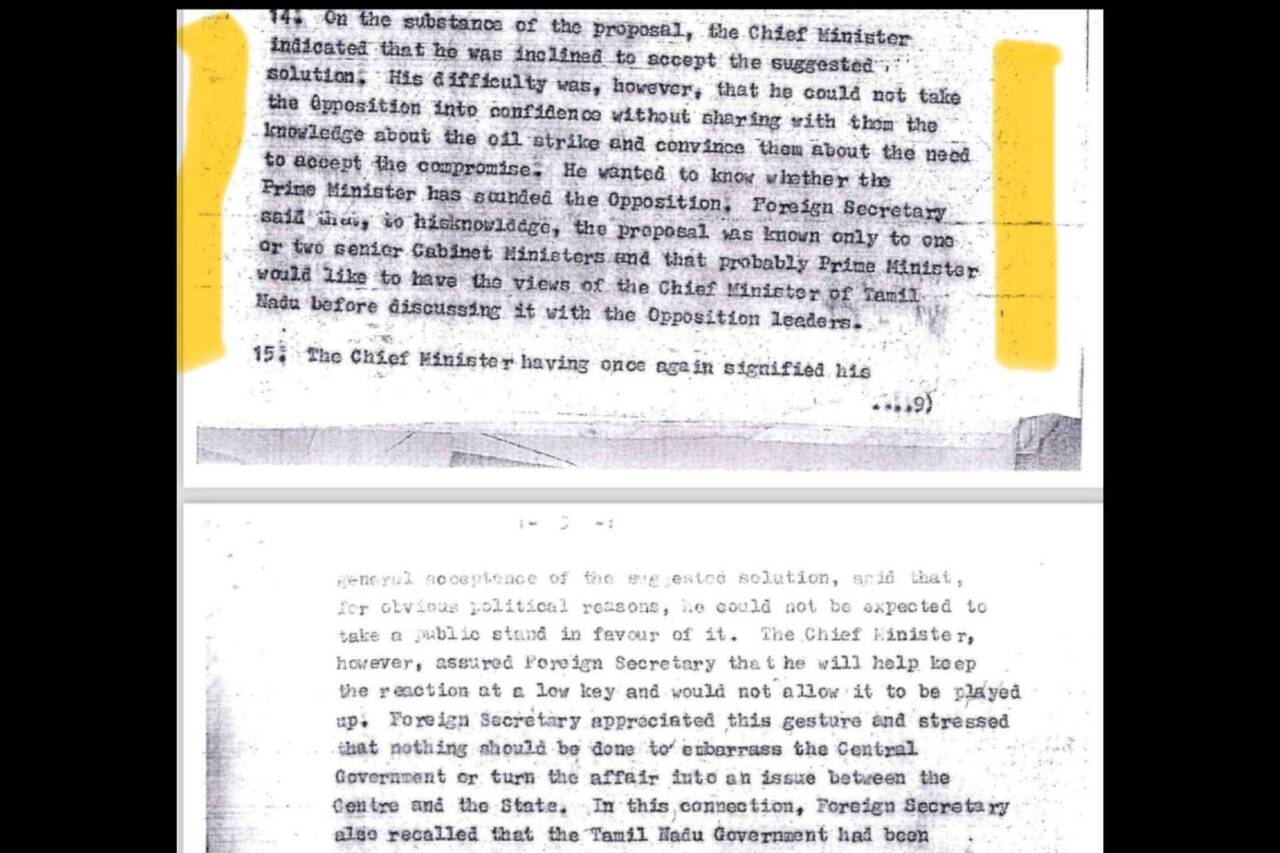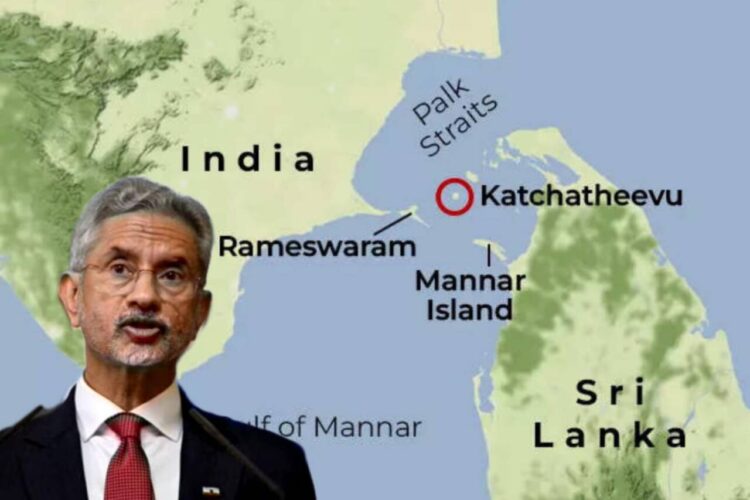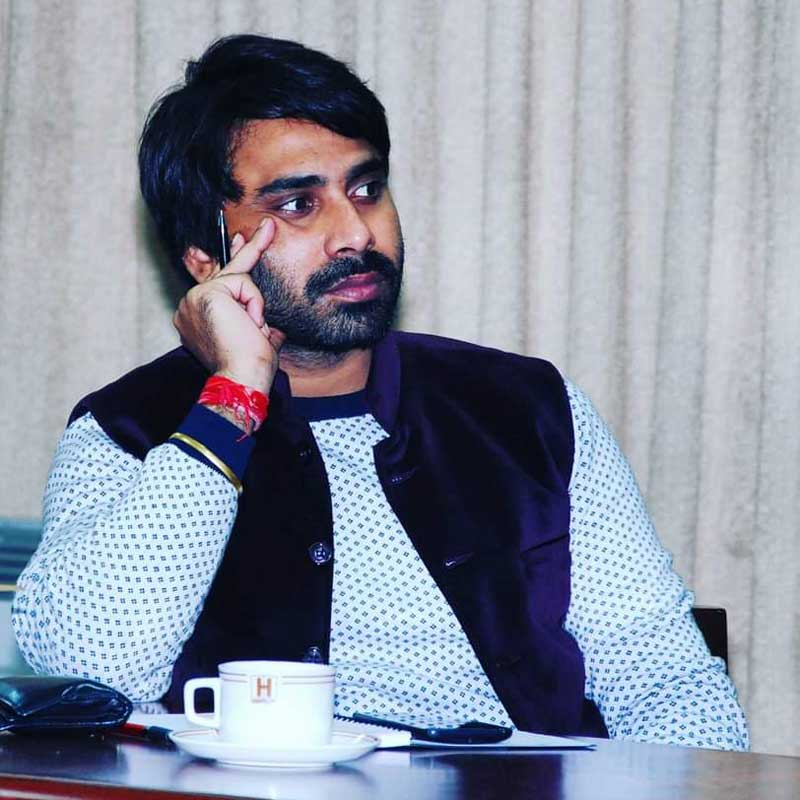On Sunday, March 31, Prime Minister Narendra Modi took to his X handle to shed light on how the Congress party purportedly ceded the ‘Katchatheevu Island’ to Sri Lanka during the tenure of the then Prime Minister Indira Gandhi. The Prime Minister referenced a news report from the Times of India, which stated that an RTI reply revealed the transfer of this 1.9 square-kilometre island, located about 20 km from the Indian shore, to Sri Lanka.
In his post, PM Narendra Modi expressed astonishment and dismay, stating, “Eye-opening and startling! New facts reveal how Congress callously gave away Katchatheevu. This has angered every Indian and reaffirmed in people’s minds—we can’t ever trust Congress! Weakening India’s unity, integrity, and interests has been Congress’ way of working for 75 years and counting.”
The Katchatheevu Island, situated within the India-Sri Lanka border near Rameswaram, has become a subject of contention, sparking demands for its repossession. Historically, the island has served as a shared enclave for Tamil fishermen from both India and Sri Lanka. The pivotal moment came in 1974 when then-Indian Prime Minister Indira Gandhi relinquished sovereignty over the island to Sri Lanka as part of a bilateral agreement.
For Nehru and Indira Gandhi, Katchatheevu was, “a small island of no importance” and “a piece of rock”
On April 1, External Affairs Minister S Jaishankar lashed out at the Congress and DMK saying that the parties approached the Katchatheevu issue as though they ‘bear no responsibility’. He emphasised that the public has the right to know how Katchatheevu was given away.
At a press conference in Delhi at the BJP office, Jaishankar said, “We know who did this, what we don’t know is who hid it. Public has the right to know how Katchatheevu island was given to Sri Lanka, and why even the fishing rights of Indian fishermen were also given up in 1976 after giving an assurance to the Parliament that fishing rights of Indians in the 1974 agreement have been safeguarded.”
“In 1974, India and Sri Lanka concluded an agreement where they drew a maritime boundary, and in drawing the maritime boundary, Katchatheevu was put on the Sri Lankan side of the boundary,” he added.
“In 1974, India & Sri Lanka concluded an agreement where they drew a maritime boundary, and in drawing the maritime boundary #Katchatheevu was put on the Srilankan side of the boundary…”: EAM @DrSJaishankar pic.twitter.com/HLJnxr2HUy
— Nishant Azad/निशांत आज़ाद🇮🇳 (@azad_nishant) April 1, 2024
“But the most important discussion was what happened in 1974, a few months before the Katchatheevu agreement was made. Whether it was Pandit Nehru or Indira Gandhi, Katchatheevu for them was nothing more than a ‘rock’, ‘a small island of no importance,” he claimed.
He further added, “In the last 20 years, 6184 Indian fishermen have been detained by Sri Lanka and 1175 Indian fishing vessels have been seized, detained or apprehended by Sri Lanka. This is the background of the issue that we are discussing. In the last five years, the Katchatheevu issue and the Fisherman’s issue have been repeatedly raised by various parties in the Parliament. It has come up in parliament questions, debates and in the consultative committee,”
“In the last 20 years, 6184 Indian fishermen have been detained by Sri Lanka and 1175 Indian fishing vessels have been seized, detained or apprehended by Sri Lanka. This is the background of the issue that we are discussing. In the last five years, the Katchatheevu issue and the… pic.twitter.com/odyXOOnsLk
— Nishant Azad/निशांत आज़ाद🇮🇳 (@azad_nishant) April 1, 2024
Calling it a “live issue” and not something that surfaced “suddenly,” Jaishankar said, “The then CM of Tamil Nadu has written to me numerous times. And my record shows that, to the current CM, I have replied 21 times on this issue. This is not an issue that has suddenly surfaced. This is a live issue.”
“It is an issue that has been very much debated in parliament and in Tamil Nadu circles. It has been the subject of correspondence between the union government and the state government,” he added.
He also said, “DMK questions handing over Katchatheevu to Sri Lanka, claims Tamil Nadu government not consulted; fact is it was kept fully informed.”
Lashing out at Congress & DMK for their attitude towards the issue, he said, “Congress & DMK have approached this matter as though they have no responsibility for this.”
“As though the situation is for today’s central government to resolve, there is no history to this, this has just happened, they are the people who are taking up the cause; that is the way they would like to project it,” he added.
Details from the RTI
According to the news report shared by PM Modi, the RTI application in question was filed by Tamil Nadu BJP chief K Annamalai. Shocking revelations emerged from the reply to this RTI application, detailing how India’s wavering stance led to its failure to assert control over the island in the Palk Strait. The report highlights Congress’ reluctance towards claiming Katchatheevu, tracing back to the Nehruvian era.
The documents also shed light on Sri Lanka’s assertion of sovereignty over the island shortly after gaining independence. Prime Minister Jawaharlal Nehru’s memorandum, dated May 10, 1961, downplayed the matter, expressing willingness to relinquish India’s claims.
Documents from the Ministry of External Affairs, accessed by Organiser reveal startling facts. These documents also reveal the opinion of the then Prime Minister Jawaharlal Nehru over the island.
“I attach no importance at all to this little island and I would have no hesitation in giving up our claim to it. I do not like matters like these pending indefinitely and being raised again and again in Parliament,” said Nehru on May 10, 1961, in the document.

The MEA document reveals that while DMK had launched protests against ceding the island in 1974, party chief Karunanidhi had accepted the Centre’s proposal.
“On the substance of the proposal, the Chief Minister indicated that he was inclined to accept the suggested solution…the Chief Minister having once again signified his general acceptance of the suggested solution, said that, for obvious political reasons, he could not be expected to take a public stand in favour of it,” the documents say about the foreign secretary’s meeting with the CM.
The document says the Chief Minister assured the Foreign Secretary that he would help keep the reaction “low key” and would not allow it to be played up.
“Foreign Secretary appreciated this gesture and stressed that nothing should be done to embarrass the Central Government or turn the affair into an issue between the Centre and the state,” the documents say.
They add that the Tamil Nadu government had been “kept informed throughout the negotiations with Sri Lanka”.
The Foreign Secretary, in that meeting, had also thanked the Chief Minister for favouring him with the views of the Tamil Nadu Government and said he would report to the Foreign Minister and Prime Minister about his talks with the Chief Minister.
In this meeting, Karunanidhi, however, told the Foreign Secretary about his “difficulty” that he could not take the opposition into confidence without sharing with them the knowledge about the oil strike and convince them about the need to accept the compromise. The CM wanted to know whether then PM Indira Gandhi had sounded the opposition.

“Foreign secretary said, to his knowledge, the proposal was known only to one or two senior Cabinet Ministers and that probably the Prime Minister would like to have the views of Chief Minister of Tamil Nadu before discussing it with the opposition,” the documents reveal.
The CM also wanted to know if any mass hysteria had been built in Sri Lanka over Katchatheevu.
“Foreign Secretary said that the controlled press in Sri Lanka, unlike that of India, could whip up public feeling on the subject and make a solution difficult to attain.” The foreign secretary also said that various suggestions had been mooted by the Indian side — like a condominium, a line cutting through the island, and a line skirting the island.
“But none of this is acceptable to Sri Lanka,” the foreign secretary told the CM. At one stage, the Tamil Nadu chief secretary suggested that the strong feelings prevalent in the state could help strengthen the central government’s bargaining posture.
“Foreign secretary said this had not been lost sight of but apparently it has had no effect on the Sri Lankan side,” the documents say. Interestingly, the Centre’s then Attorney General, MC Setalvad, in his opinion to the Centre on October 19, 1958, had said: “…it appears that the balance lies in favour of concluding that the sovereignty of the island was and is in India.”
A little Background
As per the report published in TOI, until 1974, India’s response to the Katchatheevu issue was marked by indecision. Despite opinions like that of Attorney General M C Setalvad in 1960, asserting India’s stronger claim, the Ministry of External Affairs remained uncertain about sovereignty. The documents highlight the continuity of rights vested in the State of Madras from the Raja of Ramnad, independent of Colombo’s authority, from 1875 to 1948.
Though doubts persisted, MEA’s joint secretary K Krishna Rao acknowledged India’s strong legal case, especially regarding fishing rights, crucial for Indian fishermen detained by Sri Lankan Navy. Even with opinions like that of Gundevia, who downplayed the island’s significance, the Indian government hesitated to give it up, as revealed in discussions with the consultative committee in 1968.
Opposition voices in Parliament criticised Indira Gandhi’s government for apparent concessions to Sri Lanka, suspicions fueled by perceived secretive negotiations during Dudley Senanayke’s visit in 1968. Despite denials of signing away the island, the Indian government admitted its disputed status and ‘balanced’ India’s claim with bilateral ties, drawing parallels to Nehru’s stance on Aksai Chin.
In 1974, after talks in Colombo, India conveyed its decision to relinquish its claim to Tamil Nadu’s Chief Minister, citing evidence favouring Sri Lanka’s sovereignty, including historical records and lack of documentary proof from India’s side.
Foreign Secretary Kewal Singh cited internal and external factors for the decision, including the discovery of oil by India, Sri Lanka’s sovereignty assertions, and reluctance to pursue legal recourse due to World Court tendencies.




















Comments